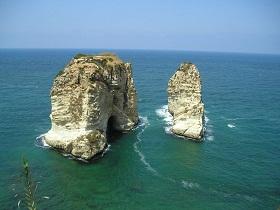Using AI to control energy for indoor agriculture
30 September 2024
Published online 13 November 2010

A new, interdisciplinary European Union-funded project will bring the American University in Beirut (AUB) together with 19 international academic, research and industrial partners to study the potential therapeutic properties of marine life, and promote biodiversity.
A United Nations Development Programme (UNDP) project in 2006 twinned the AUB with the University of Helsinki, Finland for collaborative research. Two years later, IBSAR, the Nature Conservation Centre for Sustainable Futures at AUB, and a group of visiting Finnish scientists proposed joint biodiversity projects.
The first of these, called Project MAREX, kick started this October in the Finnish capital Helsinki. MAREX involves partners from 13 countries collecting, isolating and classifying marine organisms from the Mediterranean, Baltic and Arabian Seas, along with the Atlantic, Pacific and Indian Oceans.
"There is no shortage of attempts to explore the marine biodiversity of the [Middle East]. However, this is the first comprehensive, international and interdisciplinary attempt," says Marwan El-Sabban, a cell biologist at AUB.
The project, with a 6 million euros budget from the EU Framework Programme 7, will study marine organisms, such as fish, sea anemones, cyanobacteria and algae. The researchers will analyse extracts from the samples for therapeutic uses, such as anti-inflammatory and anti-cancer agents.
The team is hopeful that identifying medicinal properties will raise public awareness about the importance of biodiversity, rather than drive unsustainable exploitation of these natural resources.
"The exploration of biodiversity for therapeutic use and conservation are not mutually exclusive," says El-Sabban. "Highlighting the value of such resources may enhance our sensitivity to conserve nature."
Ultimately we would like to partner with some regional countries to exchange expertise and share data that will benefit the region.
According to El-Sabban, the AUB will be primarily collecting and analysing samples from the eastern Mediterranean. They will also be receiving samples from the other 12 countries to perform biological assays.
"Several members of IBSAR, with diverse expertise, will now engage in extraction, bio-fractionation and screening for important biological activities and industrial applications from marine organisms," adds Najat Saliba, a chemist at AUB.
"Over the years we have developed assays that test the ability of some substances to interfere with the most devastating aspect of cancer: metastasis," explains El-Sabban. With state-of-the-art labs and experienced scientists, he is confident they are poised to make some important breakthroughs.
To make sure that these discoveries do not reduce biodiversity through human over-exploitation, the MAREX researchers will work on synthesizing useful organic compounds identified through the 4-year study. Sustainable cultivation methods will also be developed to domesticate some species that can be harvested sustainable for large-scale use.
AUB has previous experience in these models, says El-Sabban. "We have used bio-guided fractionation to isolate a single molecule from one of our native plants that has promising anti-cancer activity. Thereafter we cultivated this plant as a sustainable source for the raw material."
El-Sabban and Saliba are hopeful they can protect against over harvesting by educating the public , especially young adults, about the inherent value of the rich marine life in the region. "Effort should be spent to catalogue our resources and capitalize on their uniqueness, while promoting responsible action for their preservation," adds El-Sabban.
IBSAR would like to extend their efforts in the Middle East by working on other projects with regional partners, albeit not on the same scale as MAREX.
"Ultimately we would like to partner with some regional countries to exchange expertise and share data that will benefit the region," says El-Sabban.
doi:10.1038/nmiddleeast.2010.223
Stay connected: